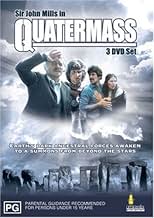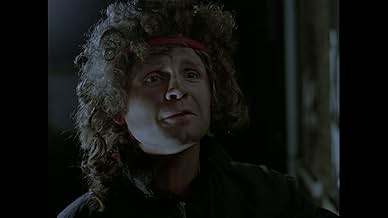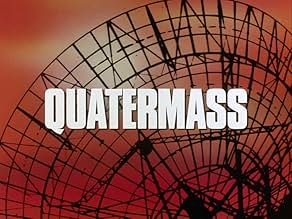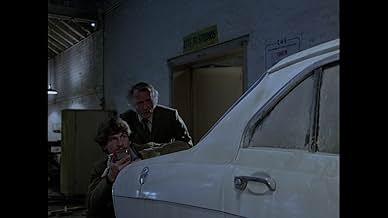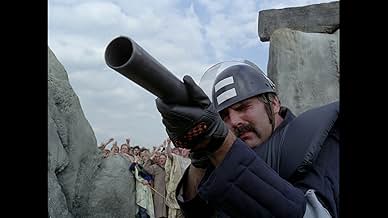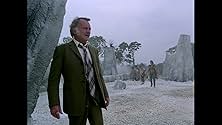Ajouter une intrigue dans votre langueIn the distant future, a now-elderly Bernard Quatermass investigates the disappearance of his granddaughter and a mysterious cult.In the distant future, a now-elderly Bernard Quatermass investigates the disappearance of his granddaughter and a mysterious cult.In the distant future, a now-elderly Bernard Quatermass investigates the disappearance of his granddaughter and a mysterious cult.
Parcourir les épisodes
Avis à la une
I saw this series when first aired, when I was just a kid, and while I remembered little about the story, I did remember that it made more of an impression on me than most SF shows of the time. Now I can see why.
The setting is very much 'future 70s', with hippies, oil restrictions, social collapse, power cuts, and other fears of that era, the effects are certainly very old by modern standards, and Mills' Quatermass is too undeveloped and unsympathetic for my tastes. However, the story makes up for it, and there are some memorable ideas (like gladiatorial games in Wembley Stadium) and some memorable scenes (again, the Wembley Stadium 'harvesting' scene in particular, and the S&M 'family show' would also have been a lot more fun on Saturday night TV than Noel Edmonds).
One thing I hate about bad SF is that the aliens are just people with a few rubber bits stuck on their face, who come to Earth to kidnap women or steal our resources, or some other mundane and, frankly, very human goal. Quatermass' aliens, on the other hand, are never seen and we never even really find out quite what they're doing, just that they're extremely powerful and don't care about humans in the least... it's a far more intelligent premise, and very Lovecraftian, in a way.
So, the effects are dated, Quatermass himself could have done with more work and possibly a different actor, but overall it's an intelligent premise, and, frankly, the idea of an attack by hugely powerful aliens who care nothing for the human race is far more scary to me than most so-called 'horror' movies of recent years.
The setting is very much 'future 70s', with hippies, oil restrictions, social collapse, power cuts, and other fears of that era, the effects are certainly very old by modern standards, and Mills' Quatermass is too undeveloped and unsympathetic for my tastes. However, the story makes up for it, and there are some memorable ideas (like gladiatorial games in Wembley Stadium) and some memorable scenes (again, the Wembley Stadium 'harvesting' scene in particular, and the S&M 'family show' would also have been a lot more fun on Saturday night TV than Noel Edmonds).
One thing I hate about bad SF is that the aliens are just people with a few rubber bits stuck on their face, who come to Earth to kidnap women or steal our resources, or some other mundane and, frankly, very human goal. Quatermass' aliens, on the other hand, are never seen and we never even really find out quite what they're doing, just that they're extremely powerful and don't care about humans in the least... it's a far more intelligent premise, and very Lovecraftian, in a way.
So, the effects are dated, Quatermass himself could have done with more work and possibly a different actor, but overall it's an intelligent premise, and, frankly, the idea of an attack by hugely powerful aliens who care nothing for the human race is far more scary to me than most so-called 'horror' movies of recent years.
"The Quatermass Conclusion" is one of the few 'true' pieces of science fiction ever committed to film and Nigel Neale's script rates up there with "2001" and "Dark Star" for inventiveness. Unfortunately it suffered from an obviously low budget and there are lapses here and there into melodrama. The story, set in a dystopian Britain, concerns the arrival of an unknown alien force which is 'harvesting' the youth by leading them to ancient ritual sites. Professor Quatermass (John Mills) comes out of retirement to look for his missing granddaughter and is drawn into the fight to save the planet's population. There are some disturbing images such as Wembley Stadium reduced to a 'killing ground' and the pensioners forced to live underground for safety. Many of the predictions in the film have since come about, such as the upsurge in 'hippy travellers' and the general social decay of the inner cities.
You have to hand it to Nigel Kneale.... Even after all these years, his works still have the power to leave you feeling just a bit disturbed. Not in the out and out conventions of most horror/sci-fi titles, but with the underlying neuroses and paranoias that afflict all societies, regardless of culture.
All of the Quatermass serials contained these elements, so much so that they were practically strip-mined by The X Files. And so, regardless of the quaint anachronisms that they contain, they still, somehow, manage to retain something for the modern viewer.
The 1970's Quatermass series is the most anachronistic of all, because it is so unlike the earlier serials (produced in the 50's and 60's, as were the film versions of said series). This makes the aesthetic of the series so much more nihilistic. Made under the backdrop of the (then) rising punk scene, the random violence and criminal behaviour that is portrayed must have seemed entirely topical. Even the relative cheapness of the production adds to this aesthetic: so very 70's Brit sci-fi.
But the series was written back in the late 60's, originally intended to be the 4th film in the movie series (especially with the relative success of the "Quatermass and the Pit" film). This is why we have the strange interbreeding of hippy culture and guns....
As such, you have to say that Kneale was certainly visionary in that oh-so grim British way.... And the concept that human beings might be hardwired to seek out destructive (even genocidal) religious ideals (by unseen, advanced intelligences), capable of being intensified remotely for "harvesting" (for reasons unknown), certainly has a lot of resonance in today's world.
The acting in the series was variable (understandable for a TV series). John Mills is capable as the aging and (initially) confused Quatermass, desperately seeking his granddaughter in a world that seems to be falling apart. Once the threat is recognised, the scientist in him takes over, leading to a slow and tragic conclusion.
Simon McCorkindale, an actor who seemed to be on top of his game at this time, ably plays Quatermass's sidekick, Joe Kapp. Never the safest thing to be in any Quatermass serial, Kapp is taken through the emotional wringer in ways too horrible for a husband and father to bear, before facing the fate of sidekicks before him.
Bruce Purchase and David Yip provide temporary interest (never destined to be long-lived in a Quatermass serial).
On the flipside, Ralph Arliss is quite painful as the murderous (and annoying) Kickalong, whose fate is far too kind (and long in waiting). There is an earlier scene where a group of the planet people are massacred whilst walking between rival gangs having a shootout. Something like that would have been more appropriate for Kickalong, but it was, sadly, not to be....
The effects are of a pretty low standard, but given everything else, this doesn't really seem to matter. Given the cheap, 70's budget the producers had to work with (we certainly aren't looking at a Space: 1999 cashflow here), they managed to perform miracles.
I remember first watching this some time in the 80's (I'm not sure when precisely) on late-night TV. The darkly-nihilistic atmosphere of the series attracted me to it, then, because it was so different to other sci-fi shows going around. Years later I still find it strangely appealing, even with the faults of its age.
All of the Quatermass serials contained these elements, so much so that they were practically strip-mined by The X Files. And so, regardless of the quaint anachronisms that they contain, they still, somehow, manage to retain something for the modern viewer.
The 1970's Quatermass series is the most anachronistic of all, because it is so unlike the earlier serials (produced in the 50's and 60's, as were the film versions of said series). This makes the aesthetic of the series so much more nihilistic. Made under the backdrop of the (then) rising punk scene, the random violence and criminal behaviour that is portrayed must have seemed entirely topical. Even the relative cheapness of the production adds to this aesthetic: so very 70's Brit sci-fi.
But the series was written back in the late 60's, originally intended to be the 4th film in the movie series (especially with the relative success of the "Quatermass and the Pit" film). This is why we have the strange interbreeding of hippy culture and guns....
As such, you have to say that Kneale was certainly visionary in that oh-so grim British way.... And the concept that human beings might be hardwired to seek out destructive (even genocidal) religious ideals (by unseen, advanced intelligences), capable of being intensified remotely for "harvesting" (for reasons unknown), certainly has a lot of resonance in today's world.
The acting in the series was variable (understandable for a TV series). John Mills is capable as the aging and (initially) confused Quatermass, desperately seeking his granddaughter in a world that seems to be falling apart. Once the threat is recognised, the scientist in him takes over, leading to a slow and tragic conclusion.
Simon McCorkindale, an actor who seemed to be on top of his game at this time, ably plays Quatermass's sidekick, Joe Kapp. Never the safest thing to be in any Quatermass serial, Kapp is taken through the emotional wringer in ways too horrible for a husband and father to bear, before facing the fate of sidekicks before him.
Bruce Purchase and David Yip provide temporary interest (never destined to be long-lived in a Quatermass serial).
On the flipside, Ralph Arliss is quite painful as the murderous (and annoying) Kickalong, whose fate is far too kind (and long in waiting). There is an earlier scene where a group of the planet people are massacred whilst walking between rival gangs having a shootout. Something like that would have been more appropriate for Kickalong, but it was, sadly, not to be....
The effects are of a pretty low standard, but given everything else, this doesn't really seem to matter. Given the cheap, 70's budget the producers had to work with (we certainly aren't looking at a Space: 1999 cashflow here), they managed to perform miracles.
I remember first watching this some time in the 80's (I'm not sure when precisely) on late-night TV. The darkly-nihilistic atmosphere of the series attracted me to it, then, because it was so different to other sci-fi shows going around. Years later I still find it strangely appealing, even with the faults of its age.
This was Nigel Kneale's fourth and final Quatermass TV serial. The first three were also adapted into very good movies, this one wasn't, but it was edited down into a film, usually known as "The Quatermass Conclusion". I say avoid that and try and see this the full version, which goes for around 200 minutes. John Mills' Quatermass is very different from Andrew Keir's, Andre Morell's and most especially Brian Donlevy's Quatermass. Mills plays him as a tired and out of touch old man. The plot is set in the near future. Society has broken down, youth gangs roam the streets, while others known as "the planet people" wander the countryside. They are anti-science, anti-"progress" hippies who believe that they will one day be taken up and sent to another planet. I see some people criticise the planet people as being "out of date". These people seem to be unaware of the travellers/"crusties" phenomenon in Britain in the 1980s, and what about the "Heaven's Gate" cult of more recent years? Quatermass' granddaughter has run away from home, and while he searches for her he becomes involved with the planet people, a group of which seemingly are "taken" while congregating around some ancient standing stones. But this is only the beginning... to give away more of the plot would be a shame. The budget for this mini-series is obviously not all that large, and the special effects are modest, but they are generally pretty effective, the acting is good for the most part, and it contains an intelligence and darkness rarely seen in contemporary TV SF. 'Quatermass' has a few flaws but I think it is extremely underrated and a fine close to Kneale's Quatermass series.
I remember seeing this broadcast. It was made by Euston Films so I was expecting th usual "Sweeney" type over-grain in the picture (1970's high speed 16mm), but instead it had the full gorgeous look of a motion picture, having been shot in 35mm with full motion picture negative (whereas most American productions were shot on 35mm television stock). The special effects where not all that good where the space shots were concerned - even by 1970's standards (to see good examples of these effects look at Space 1999 (1976 - 1978) whose Director of Effects, Brian Johnson, went on to win an Oscar just a couple of years later - for Alien). But the idea that a beam would come through space and consume vast number of people and turn them into a diaphanous web was effectively executed. It would be nice to see it again in its full version - perhaps the BBC could show it without breaks in two parts. Also it was an early appearance for Simon McQuorkindale (Manimal!).
Le saviez-vous
- AnecdotesStarted life in 1973 as a BBC series called "Quatermass IV". It had been commissioned by Head of Drama Ronald Marsh, and according to Nigel Kneale, the intended producer was Joe Waters. Some model test sequences of the space station were shot, but eventually, the project was abandoned by the BBC. ITV then picked it up a few years later and produced it in association with Euston Films.
- Versions alternativesThis has been made available in the United States in two versions. It was first released edited down to a 105 minute feature film under the title The Quatermass Conclusion (1979). In 2003 the complete program was released on home video under the title "Quatermass" with a listed running time of 240 minutes.
- ConnexionsEdited into The Quatermass Conclusion (1979)
Meilleurs choix
Connectez-vous pour évaluer et suivre la liste de favoris afin de recevoir des recommandations personnalisées
- How many seasons does Quatermass have?Alimenté par Alexa
Détails
Contribuer à cette page
Suggérer une modification ou ajouter du contenu manquant

Lacune principale
By what name was Quatermass (1979) officially released in Canada in English?
Répondre
